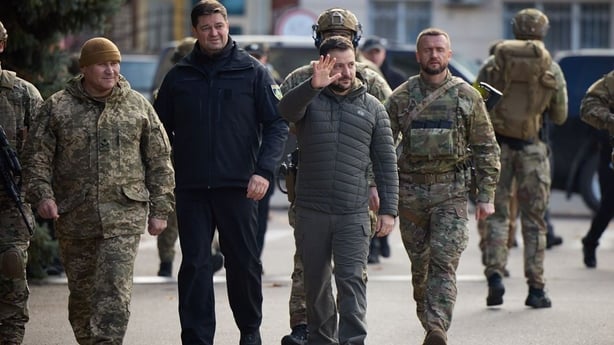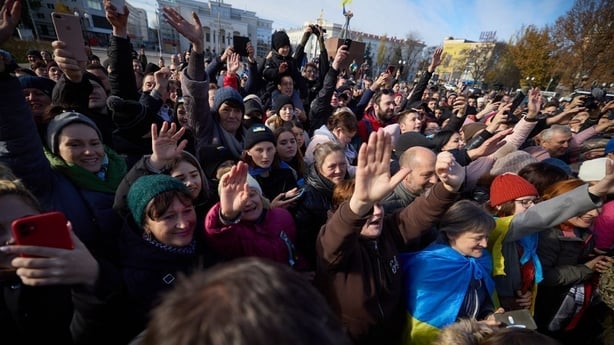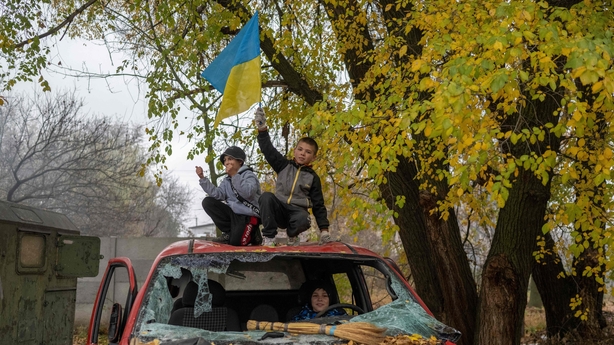Ukrainian President Volodymyr Zelensky has said the recapture of Kherson marked "the beginning of the end of the war" as he hailed the liberation of the city in a surprise visit.
Meanwhile NATO Secretary General Jens Stoltenberg has cautioned that Ukraine was facing difficult months ahead and Russia's military capability should not be underestimated, despite the takeover of Kherson.
US President Joe Biden and his Chinese counterpart Xi Jinping - a key ally of Russian President Vladimir Putin - have also agreed in talks today that nuclear weapons should never be used, including in Ukraine.
The Ukrainian presidency distributed images of Mr Zelensky singing the national anthem with his hand over his chest as the country's blue and yellow flag was hoisted next to Kherson's main administrative building.
"This is what the Russian Federation did in our country, it showed the whole world that it can kill. But all of us, our armed forces, our National Guard and intelligence (services) have shown that it is impossible to kill Ukraine," Mr Zelensky said.
"This is the beginning of the end of the war," he also said.
"It is a long way, difficult way, because the war took the best heroes of our country. We are ready for peace but our peace, for our country it's all our country, all our territory," he added.
Russian President Vladimir Putin's spokesman denied that the Ukrainian leader's visit had any impact on the status of the Kherson region, which Moscow formally annexed last month.
In Kherson, Mr Zelensky said that "the price of this war is high".
"People are injured. A large number of dead. (Russian forces) have left or escaped - we believe that they have escaped because our army has surrounded the enemy and they were in danger," he said.
"There were fierce battles, and the result is - today we are in Kherson region."

US and Russian spy chiefs meet
The US and Russian spy chiefs held a rare face-to-face meeting in Ankara today on Moscow's nuclear threats in Ukraine and Americans held prisoner by the Kremlin, the White House said.
In what appeared to be the highest-level direct talks between officials of the two countries since Russia invaded Ukraine in February, Central Intelligence Agency Director William Burns met with Sergei Naryshkin, head of Russia's SVR foreign intelligence service.
Turkish President Recep Tayyip Erdogan's spokesman confirmed the meeting, and Kremlin spokesman Dmitri Peskov said it came as "an initiative of the American side," according to Russian media.
Mr Peskov declined to provide details on the contents.
But the White House said that Mr Burns, formerly Washington's ambassador in Moscow, was delivering a warning against Russia's threat to make use of tactical nuclear weapons in the Ukraine war.
The CIA chief's message was "on the consequences of the use of nuclear weapons by Russia, and the risks of escalation to strategic stability," according to a White House statement.
The United States has warned for months over Russian threats to use tactical nuclear weapons in Ukraine if its own territorial integrity was threatened.
The United Nations General Assembly has called for Russia to be held accountable for its conduct in Ukraine, voting to approve a resolution recognising that Russia must be responsible for making reparations to the country.
The resolution, supported by 94 of the assembly's 193 members, said Russia "must bear the legal consequences of all of its internationally wrongful acts, including making reparation for the injury, including any damage, caused by such acts".
The resolution recommends that member states, in cooperation with Ukraine, create an international register to record evidence and claims against Russia.
General Assembly resolutions are nonbinding, but they carry political weight.
'Fierce battles'
Late yesterday, Mr Zelensky said Ukrainian forces found evidence of hundreds of new "war crimes" carried out by Russian occupiers in Kherson.
His subsequent visit came just days after Ukrainian troops entered the city - the Kherson region's administrative centre - after Russia pulled back its forces on Friday.
The takeover by Ukrainian troops is the latest in a string of setbacks for the Kremlin, which invaded Ukraine on 24 February hoping for a lightning takeover and to topple the government in days.
But Russian troops failed to capture the capital, Kyiv, and have since been pushed back from large portions of territory in the south and east.
Still, Mr Stoltenberg said that "the coming months will be difficult" and cautioned that: "we should not make the mistake of underestimating Russia".
"Putin's aim is to leave Ukraine cold and dark this winter," he told a press conference in The Hague after meeting the Dutch foreign and defence ministers.

The city of Kherson was the first major urban hub to fall to Russian forces and the only regional capital Russia gained control over.
Its recapture opens a gateway for Ukraine to the entire Kherson region, with access to both the Black Sea in the west and the Sea of Azov in the east.
The region was one of four that the Kremlin announced in September were annexed and part of Russia. Mr Putin vowed to use all available means to defend them from Ukrainian forces, hinting at the use of nuclear weapons.
Mr Biden and Mr Xi agreed in talks at the G20 however that nuclear weapons should never be used, including in Ukraine, the White House said.
"President Biden and President Xi reiterated their agreement that a nuclear war should never be fought and can never be won and underscored their opposition to the use or threat of use of nuclear weapons in Ukraine," it said in a statement.
Kremlin spokesman Dmitry Peskov said he would not comment on Mr Zelensky's visit to Kherson but added: "this territory is part of the Russian Federation."

Read more:
After Kherson's liberation, what next for Ukraine?
Ireland 'supportive' of EU-Ukraine training mission - Coveney
Latest Ukraine stories
